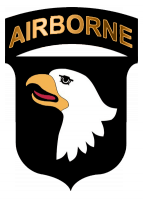Written by Staff Sgt. Candice Funchess
Headquarters, 101st Airborne Division (Air Assault)
 Fort Campbell, KY – With the current drawdown and budget restraints, can the 101st Airborne Division (Air Assault) still produce Soldiers ready to engage the enemy and win? “Absolutely.”
Fort Campbell, KY – With the current drawdown and budget restraints, can the 101st Airborne Division (Air Assault) still produce Soldiers ready to engage the enemy and win? “Absolutely.”
That was the response given by Sgt. Maj. of the Army Raymond F. Chandler III, when the question was asked during his visit to Fort Campbell, September 3rd-5th. Chandler came to meet with Soldiers and families to scout and hear what their issues and concerns were, in order to bring that information back to the Secretary of the Army John McHugh and the Chief of Staff of the Army Gen. Ray Odierno.

“Having the opportunity to see our wounded warriors and the network to help them to adapt to their limitations and to grow and have a very successful life, I think is phenomenal,” said Chandler. “I haven’t been to too many places that have that capability around the Army, but seeing the realm of what is possible for our wounded warriors is pretty exciting, and I’m highly encouraged by what I’ve seen.”
The 14th sergeant major of the Army carved time into his jam-packed itinerary to attend the 555th Parachute Infantry Association monument dedication honoring the first black paratroopers assigned to Fort Campbell, in September of 1950, noting the importance of attending the service and the overall history of this storied division.
“It’s important to recognize that this division has a great history of service to the nation since World War II. What [capabilities] they provide and the esprit de corps, I think, is unique across the entire Army,” said Chandler.
The trip continued on to the grounds of The Sabalauski Air Assault School, where Chandler spoke with Soldiers as they completed the obstacle course. He was briefed by the cadre of the school and watched demonstrations of the air assault proficiency taught and performed here, as the only air assault division in the world.
“The 101st has a unique capability; they are able to operate in an air mobile capacity, and assault positions from the sky,” said Chandler. “That makes them extremely important in supporting our Army’s mission.”
Chandler’s two-and-a-half-day visit included stops by Fort Campbell’s Kinniard Mission Training Complex, to interact with field artillery Soldiers as they conducted training on the new Advanced Field Artillery Tactical Data System; the Soldier Readiness Processing Center, to speak with Soldiers preparing for deployment; and the Soldier for Life Center, to meet with Soldiers as they prepare to transition out of the Army.
Even though Chandler met with small groups of Soldiers at different locations across the division, he still hosted a town hall event at the Passenger Processing Center to provide more Soldiers, family members and civilians the opportunity to ask questions and to speak of the needs of the 101st.
“I think it’s important that you’ve got great leadership. You have people who are committed to accomplishing their assigned missions, and doing more beyond that,” Chandler said. “And as long as you’ve got that positive attitude — Soldiers doing what they’re supposed to do and leaders helping them to get better and move forward — then we’re going to always need the 101st and its capabilities.”








